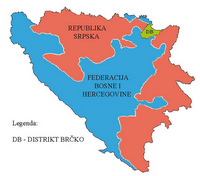Montenegro seceded from Serbia. Albanians of the Presevo Valley demand "regional self-rule". The EU severed ties with Serbia. The USA cancelled a 7 million Dollars aid package to the Serbian government. Serbia is run by a fractious minority coalition. Economy is not going well. And the ultra-nationalists gain more support every day. Will the independence of Kosovo be the borderline where the suffocated Serbia explodes in a last self-destructive effort...
EU anxious
During the EU foreign ministers summit in Brussels last week where were discussed ways to keep Belgrade on board there was a sense of uneasiness about the current relations between the Union and Serbia.
On 3rd May the EU froze pre-membership talks with Serbia because it failed to extradite the Bosnian Serb General Ratko Mladic. Serbs were told that talks can be resumed only when Mladic is apprehended.
Obviously the Europeans are now a bit alarmed about possible consequences of this too categorical decision. A poll of 9th June indicates that support for Serbian Radical Party (SRS) is over 40 percent in Serbia. The EU fears that Serbia go to "wrong direction" and fall into the nationalism trap once again.
The stick-and-carrot method works only when the stick and the carrot are balanced. The EU must have thought twice before calling off the talks with Serbia, which is still a country in a fragile transition period after all. Now that there are rumours about early elections and serious concerns about a possible Radical victory, the EU urged deeper economic and trade links with Serbia. However, will this remedy really make ordinary Serbs forget the bitter aftertaste of 3rd May?
The EU must be aware that if Serbia is "lost" this will not only Serbs' failure, but theirs as well. In a crucial time when Kosovo's final status is being discussed between Albanians and Serbs, the EU offered a precious present to Serbian Radicals to justify their argument that the EU did and will always sacrifice Serbian interests.
One cannot help remembering the great biblical wisdom, "anyone of you is without sin let him be the first to throw a stone at her". The EU just watched the Bosnian tragedy for three years. Isn't it now too simple to get rid of the heavy moral responsibility, only by accusing Belgrade of hypocrisy about extraditions?
Kosovo the borderline?
On 16th June, municipal elections in Kosovo, which normally had to be held in October, were postponed in order to guarantee that politicians remain focused on the status talks. Next month, Albanians and Serbs are expected to discuss the future status of Kosovo.
If at the end of the negotiations Albanians and Serbs cannot come to an agreement, the UN Security Council is expected to vote on Kosovo's fate by the end of the year. And the Security Council seems to lean towards independence more and more.
The international community can impose any decision indeed. Yet, the question is to know whether this decision will be a short-term or long-term solution. For one, who is slightly acquainted with the Balkan history, the prospect of such a "Diktat solution" is not bright.
That the Serbs in northern Kosovo declared a state of emergency and severed ties with Albanian government is a foretaste of worse events to come if Kosovo becomes independent.
The Serbs are a nation of great exodus. Those of 1690 and 1915 are the most famous ones.
It would not be a problem for the Kosovo Serbs to immigrate en masse to Serbia. Serbian newspapers claim that there are "contingency plans" for over 70.000 Serbian refugees if Kosovo becomes independent. The UN does not deny the allegations.
Even without this stock of angry and frustrated Serb refugees, Serbia is already going through very hard times.
Montenegro seceded from Serbia. Albanians of the Presevo Valley demand "regional self-rule". Vojvodina pleads for more autonomy. The EU severed ties with Serbia. The USA cancelled a 7 million Dollars aid package to the Serbian government. Serbia is run by a fractious minority coalition. Economy is not going well. And the ultra-nationalists gain more support every day.
Will Kosovo's independence be the borderline where the suffocated Serbia finally explodes in a last self-destructive effort? After all, it is always dangerous to force a desperate cat into a corner.
SRS the Serbian bogey
Analysts are worried about the possibility that Serbia see the redemption in an ultra-nationalist government. Over 40 percent voter support for SRS is not a negligible rate indeed.
Current speeches of SRS members give a clue how parliamentary life would be like under their rule. The language used to criticise the Minister of Agriculture Ivana Dulic-Markovic in a recent secession clearly shows the political culture of SRS.
Full of resentment that their colleague is accused of being an "Ustashi" just because she is a Croat, G17+ denounced the "language of hatred" and started a petition, which demands the ban of SRS.
How just the initiative may be, it is just a symbolic gesture. For Serbian democrats cannot win killing mosquitoes, they should dry the bog, which produces these mosquitoes. Even if SRS was banned, another party of similar ideology would appear the next hour.
Otherwise the vicious circle would not be broken. At the elections, SRS would obtain over 40 percent of the votes. In order to prevent them to come to power, several democrat parties, which are normally bitter rivals, would form a coalition government. Because of inner conflicts, this government could not be functional enough to solve the serious political and economic problems. And at the next elections, what is most feared would happen.
Today Serbia needs a renewal from down below. Only this could direct the country to the "right direction". Yet, the essential question is this: Would it all be Serbia's fault alone if what is most feared happens one day? To tell someone that he should follow the right way is not always sufficient. It is also necessary to show him the right way. In this regard, today one cannot say that the EU is a good guide, for they are about to deprive Serbia of that little light at the end of the tunnel - the EU membership.

